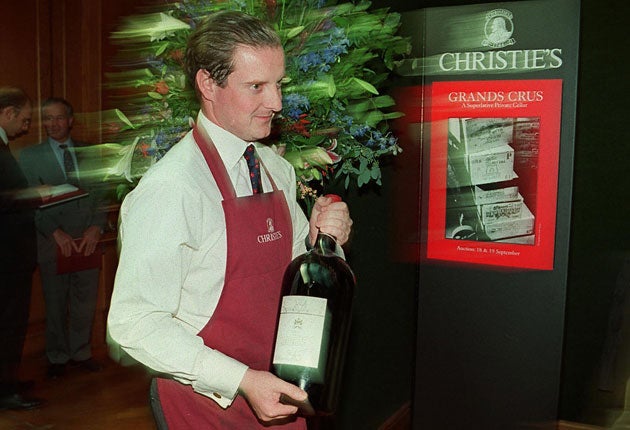Christie's sells 'fake' vintage wine, claims billionaire
Leading experts, including Michael Broadbent, are named in New York court deposition

Your support helps us to tell the story
From reproductive rights to climate change to Big Tech, The Independent is on the ground when the story is developing. Whether it's investigating the financials of Elon Musk's pro-Trump PAC or producing our latest documentary, 'The A Word', which shines a light on the American women fighting for reproductive rights, we know how important it is to parse out the facts from the messaging.
At such a critical moment in US history, we need reporters on the ground. Your donation allows us to keep sending journalists to speak to both sides of the story.
The Independent is trusted by Americans across the entire political spectrum. And unlike many other quality news outlets, we choose not to lock Americans out of our reporting and analysis with paywalls. We believe quality journalism should be available to everyone, paid for by those who can afford it.
Your support makes all the difference.Allegations that Christie's auction house sold fake wine "over decades" have been made in a New York court.
The complaint has been lodged by an American billionaire industrialist, William Koch, and is the latest salvo in a three-year battle that has embroiled Christie's and the leading British wine expert Michael Broadbent, a former director of Christie's and auctioneer who also wrote sales literature.
Mr Broadbent has already won a libel action in the UK against the publisher Random House, which published Mr Koch's allegations in a book about the dispute. In an out of court settlement, Mr Broadbent accepted substantial damages, his legal costs and an apology and retraction of the defamatory allegations which was made on behalf of the publishers in open court.
Mr Koch bought four bottles of wine in 1988 from a German wine dealer, Hardy Rodenstock, reputed to have belonged to the third president of the US, Thomas Jefferson, for a total of $311,804 (£202,000 at today's rate of exchange). Mr Rodenstock claimed to have come into possession of a cache of wine engraved with the initials Th.J after it was discovered in a bricked-up Paris cellar in the 1980s.
In his latest complaint, filed with the New York District Court at the end of March, Mr Koch claims he bought the wine because Christie's had sold other bottles from the cache and its sales literature implied they were genuine. Now, however, he believes the wines were counterfeit.
In the complaint, against Christie's companies in London and New York, he claims that Christie's and Mr Broadbent sold the Jefferson bottles knowing there were doubts about their provenance, and that Christie's sold counterfeit wine "for years".
Last night Mr Broadbent, who is not being sued but is named in the complaint, denied the allegations which he described as "unspeakably offensive".
Mr Koch's complaint adds: "Even though Christie's is often aware of circumstances, communications and events which directly challenge the veracity and substance of its catalogs' detailed narratives, provenance and wine descriptions, it fails to include any mention of these adverse authenticity or provenance questions."
The complaint names Mr Broadbent, who wrote auction catalogues and auctioned the Jefferson wine, as party to this failure to pass on information.
Mr Koch's complaint says that he didn't discover his wine may be counterfeit until 2005 when he was asked for a photograph of his bottles for a catalogue for a Boston museum.
He contacted the Thomas Jefferson Foundation in Charlottesville, Virginia to prove the provenance of the wine.
The foundation, known as Monticello, is the foremost authority on the former US president. The experts there revealed that they had been contacted by Christie's and Mr Broadbent before the wine was sold, but had found linking the wine to Jefferson "problematic".
Christie's denies the claims and said in a statement: "We intend vigorously to defend the case."
Mr Broadbent maintained last night that the bottles and the wine were of the period, and denied that he had withheld any doubts about the connection to Jefferson.
To view the full complaint, see www.nysd.uscourts.gov/pacer.php and look up case no 2010-cv-02804
Hardly a man to be messed with
William Koch (pronounced "coke") is a billionaire industrialist who lives in Palm Beach, Florida. He's also renowned as an art and wine collector, philanthropist and sailor – he was part of the winning America's Cup crew in 1992 after bankrolling the US entry – and is not, it seems, a man to be messed with. Born in 1940 in Wichita, Kansas, he is a son of Fred Koch, the founder of Koch Industries, one of the largest oil companies in America. Having inherited the business with his brothers in 1967 on their father's death, William was subsequently forced out in 1980 after trying to take over. He then sued his brothers, claiming that Koch Industries was engaged in "organised crime". In 1983 William Koch founded the Oxbow Group, which sells $600m worth of alternative energy each year.
In 1995, he filed a lawsuit against his former lover, the model and fashion journalist Catherine de Castelbajac, when she refused to move out of his $2.5m condominium at the Four Seasons Hotel in Boston.
Join our commenting forum
Join thought-provoking conversations, follow other Independent readers and see their replies
Comments